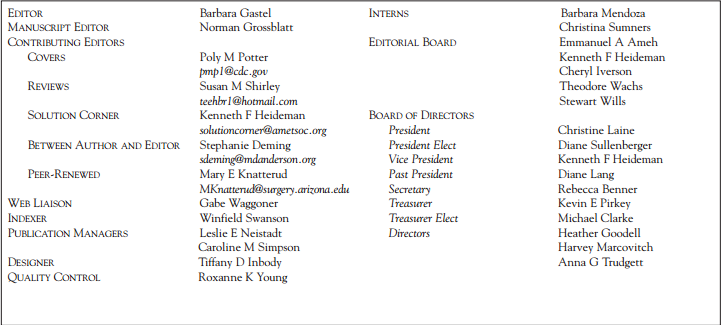When I entered scientific journal editing, I was overwhelmed by the breadth of things that I needed to learn about—intellectual property, peer review, scientific misconduct, authorship, to name a few. I quickly recognized that my undergraduate degree in writing and years of training and experience in clinical medicine and research methods provided only a tiny fraction of what I needed to be a good journal editor. Frank Davidoff, my mentor and then–editor of Annals of Internal Medicine, urged me to become involved in the Council of Science Editors (which was the Council of Biology Editors at the time). He assured me that membership would help me to connect to this new world.
Frank’s advice was on the mark. I did learn, and continue to learn, much from CSE. Actually, let me clarify that statement—I have learned, and continue to learn, much from the people who are CSE. The greatest value of membership is the community that CSE connects me to. This community is marvelously diverse in scientific discipline, geography, and role. CSE is an organization that enables the publisher of a North American astronomy journal to converse with the editor of an African medical journal. CSE is a forum where editors of chemistry, meteorology, genetics, and clinical medical journals can together try to answer the question “What is an author?” CSE is a place where the editor of a general medical journal can gain feedback on an editorial policy from the editor of a physics journal. Through CSE, I have developed relationships with dozens of bright people from whom I can seek advice and inspiration and to whom I hope I can return the favor.
Now, more than a decade after joining the organization, I am beginning my year as president. It is a privilege to assume a leadership role in this diverse community. In concert with CSE’s strategic plan, I will focus on the following: expanding membership, collaborating with other editorial organizations in matters of common concern, and developing novel programs and processes to increase and facilitate the already strong educational and networking functions of the organization.
Current times present new challenges, such as pressure for free and open access to the scientific literature, widespread conflicts of interest among researchers, and new threats to scientific integrity. However, the increasing capacities of electronic publication, the globalization of science, and rapid progress in the sciences create exciting opportunities for scientific publishing. CSE is uniquely positioned to address concerns common to science editors regardless of the type of science they publish. Collaboration among those in different scientific disciplines can only help us to overcome the challenges, avoid the pitfalls, and reap the benefits.
CSE is a dynamic community of professionals dedicated to the responsible, effective communication of science. CSE is a supportive network for career development and a continuously expanding source of knowledge and tools that promote highquality editorial practices. Recently, I gave a colleague new to editing who felt as though she had set foot on an alien planet the advice that Frank Davidoff had offered to me: Join CSE.
Christine Laine

